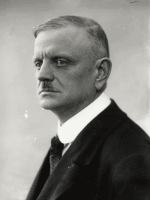The Jäger March
| Jäger March | |
|---|---|
| Military march by Jean Sibelius | |

Sibelius in 1918
|
|
| Native name | Jääkärimarssi |
| Catalogue | Op. 91a |
| Composed | 1917 |
| Performed | 19 January 1918 |
| Scoring |
|
The Jäger March (Finnish: Jääkärimarssi, originally Jääkärien marssi), Op. 91a, is a military march by Jean Sibelius. He set in 1917 words written by the Finnish Jäger, Hilfsgruppenführer Heikki Nurmio who served in Libau, in the Royal Prussian 27th Jäger Battalion of the Imperial German Army. This unit was fighting against the Russian Empire, of which the Grand Duchy of Finland still was a part. The words were smuggled into Finland to Sibelius, who composed the song in Järvenpää.
Sibelius wrote the Jäger March originally for men's chorus and piano, and later arranged it for men's chorus and symphony orchestra. The first public performance of Jäger March was in Helsinki on 19 January 1918 by the choir Akademiska sångföreningen, led by Olof Wallin. The Finnish Civil War began on the same day between the White and the Red troops. The march is the honorary march of many army detachments.
Syvä iskumme on, viha voittamaton,
meil' armoa ei kotimaata.
Koko onnemme kalpamme kärjessä on,
ei rintamme heltyä saata.
Sotahuutomme hurmaten maalle soi,
mi katkovi kahleitansa.
Kertosäe (×2):
Ei ennen uhmamme uupua voi,
kuin vapaa on Suomen kansa.
Deep is our blow, our hate is invincible,
We do not have mercy, nor a homeland.
Our happiness is at the tip of our sword,
We do not feel merciful.
Our cry of war will be given for our country,
Which is cutting its chains.
...
Wikipedia
